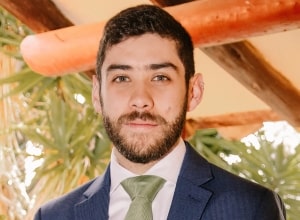Dulce Rubio Develops Tool to Address Landmines
By Emma Folts
Growing up in Bogotá, Colombia, Mateo Dulce Rubio would hear a familiar news story every few days. Someone, he’d learn, had stepped on another landmine. The explosion had killed or injured them. Though the capital city was far from the country’s war-torn areas, these accidents stayed in the back of his mind.
Now a fifth-year doctoral student at Carnegie Mellon University, Dulce Rubio studies statistics at Dietrich College of Humanities and Social Sciences and public policy at Heinz College of Information Systems and Public Policy.
While landmine risk is not a problem for people in the U.S., it does affect people living in developing countries.
Three years ago, Dulce Rubio began leading a team of classmates and faculty in developing a three-pronged system for more accurately identifying landmine contamination. They’ve since collaborated with the United Nations Mine Action Service (UNMAS) to refine the system, called RELand. A humanitarian organization in Colombia has been testing RELand in two municipalities for more than a year, in a process known as a field test.
